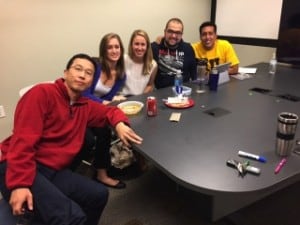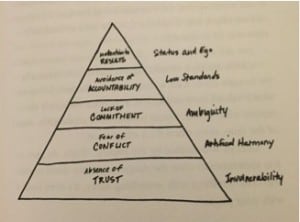Semester Series: Kirk Smith – Leadership Coaching from the Other Side of the Table
“Leadership and learning are indispensable to each other.” – John F. Kennedy
What a difference a year makes. This time last year, I was just meeting my Leadership Coaching Fellow (LCF), a new position created as part of the Leadership curriculum at the Goizueta Business School. Each core team was assigned a LCF that would work with them to help improve the group dynamics, enhance productivity, and turn groups into efficient teams. Like many first year endeavors, it wasn’t perfect. By the time we met our coach many of my operating habits were so engrained that they were difficult to reverse with the limited time we were given. As any good organization will do, they responded to feedback in an effort to improve the experience provided to the incoming two-year class of 2017. To me, there were two important changes:
- Introducing LFC’s early in the Process- As I mentioned, my coach last year, while incredibly passionate about helping our team operate more effectively, did not have enough time to truly foster change in our group dynamics. By introducing LCF’s in the first week of the first year students’ program, LCFs will have the ability to addresses things immediately.
- Providing Greater Structure- By building the requirements for the leadership program into the first year of the curriculum, this makes student participation in the program mandatory. During my first year, participation was “required,” but not mandatory. As a result, there were no penalties for an individual who did not attend a LCF-hosted meeting, or fill out an important survey.
Due to these changes, I decided to join the program as a second year LCF. I was lucky enough to be paired with a one-year student who was very focused on providing the best experience possible for our new core team. As a team, I can partner with the other LCFs to cover more topics in meetings while providing additional perspectives based on our program differences. Again, I’ve been lucky that my core team is essentially full of rock stars; they trust each other and they take the experiences learned from the LCF and translate them into meaningful objectives that allow them to work together and independently more efficiently. At this point in the semester, we’ve already seen demonstrable improvement in their meeting efficiency, a key issue during your first year of business school.
Ultimately, business school is a giant lab for you to take advantage of during your time here. You can experiment with different leadership techniques, coaching skills, and delegation tactics. There are many opportunities for you to do so too. Whether it is on your team, through student government, or running a club, you can craft your experiences to determine who you are as a leader. During this summer, I read the Five Dysfunctions of a Team by Patrick Lencioni. It was an incredible novel about what happens when a team performs poorly, and more importantly, how they can get better. There was a simple diagram in the book that I wish I had known about my first year because it would have prevented a fair amount of heartburn and headache on my team. I’ve used this chart in multiple sessions with the core team I’m working with, and they have identified how their behaviors are linked to the pyramid. Combining my theoretical study with the real world application I receive from coaching others, I believe I am becoming a stronger leader. Or at least one more aware of when my team screws up!


